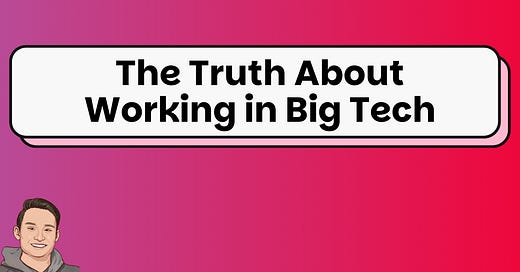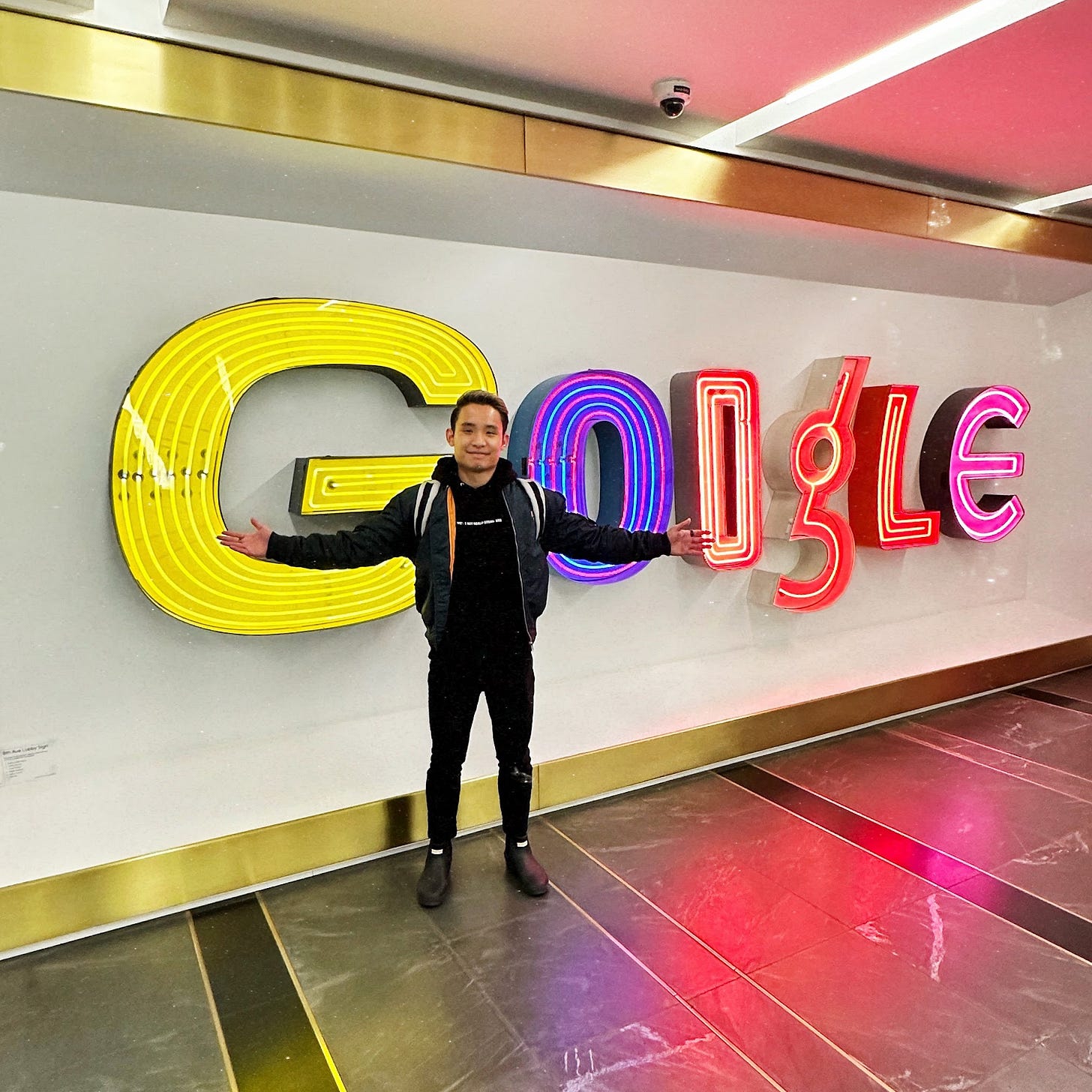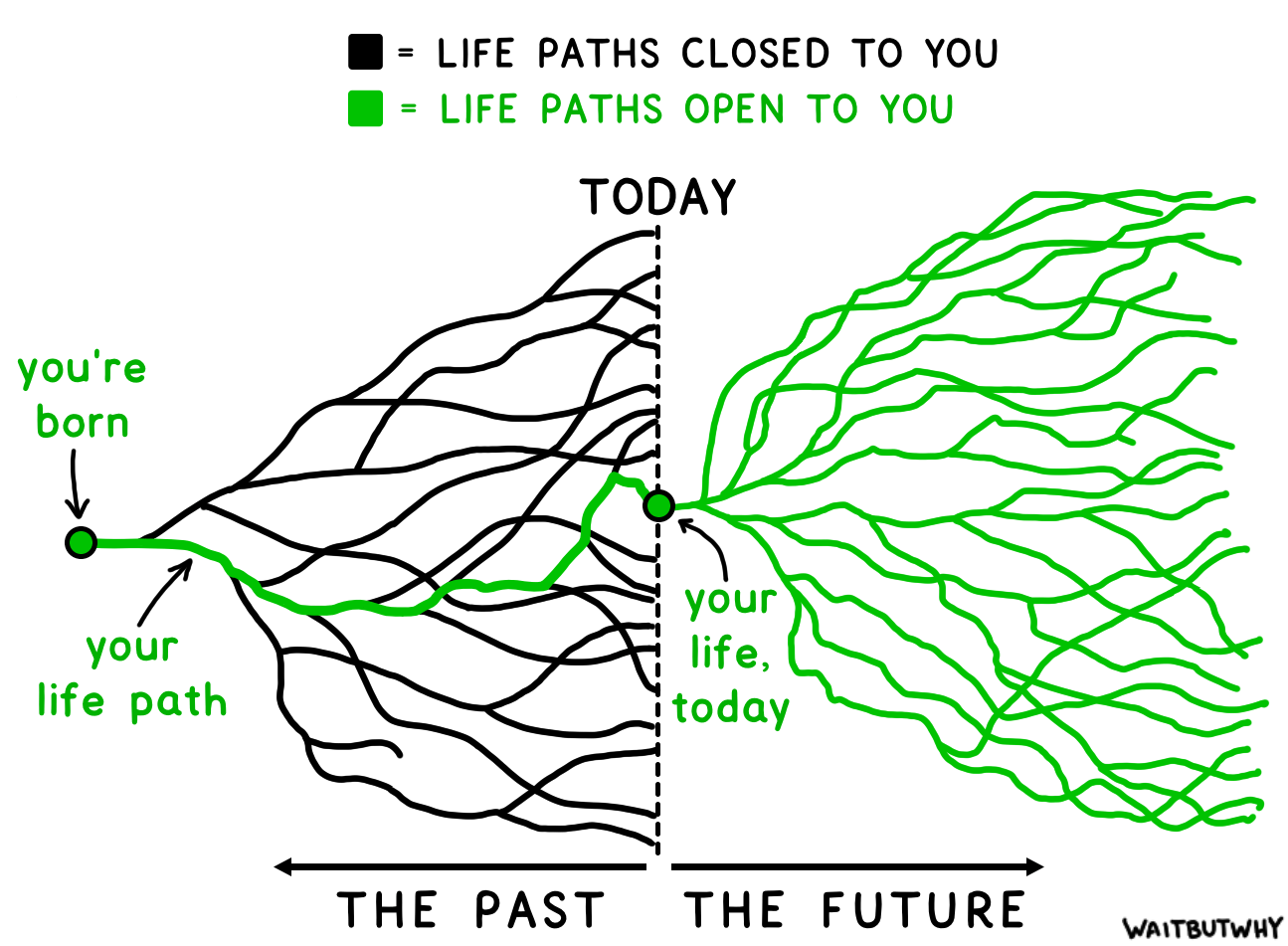The Truth About Working in Big Tech
Why I walked away from my dream job—and the biggest lessons from my time at Google and Meta.
A few weeks ago, I was invited back to Google to give a talk on personal branding and entrepreneurship.
On the way to the broadcast studio, we walked through the stunning office in the Chelsea Market, passing by the French vegan bistro, rock climbing wall, corner cafes stocked with an unlimited supply of any treat imaginable—and it reminded me of how ridiculous this company was.
It brought back a flood of memories from my days at Google and Meta, where I spent a few years in product and strategy roles. I had a ridiculous salary and an incredible work-life balance.
On Tuesdays, I’d hit the gym, scooter over to the smoothie station for a custom blueberry plant-protein smoothie, then head up to the rooftop for an ice cream espresso and barbecue. Douchey, I know.
Life was good. So why did I leave?
I never set out to be an entrepreneur. Never had a grand vision of running my own thing. I just felt a pull—a calling to build something. And an even stronger fear of regret if I didn’t.
But I won’t lie… when things get tough, I’ve had moments where I ask myself: What would it be like to go back to corporate? And while I know I wouldn’t (at least not anytime soon), that question forced me to do a brutally honest review of what’s actually changed since I left.
So today, I want to share the real pros and cons of leaving big tech to build something of my own. If you’re debating a major career move—or just curious about what it’s like—hopefully this gives you some clarity.
Here goes.
The good:
The insane Big Tech lifestyle: Google has campuses in cities around the world, where you can badge in, hit the gym, eat gourmet meals, take a shower, and even bring friends. Traveling was more fun—each office felt like a mix between Disneyland for adults and a high-end coworking space with a labyrinth of amenities you never knew existed. NYC alone has over six offices with more than ten restaurants, which helped me realize that everything shown in The Internship might actually be true.
Top-tier pay: Fresh out of school, you can make upwards of $160,000 per year as a 22-year-old. After a decade as a high performer, you can make upwards of $500,000. For comparison, the average US salary is ~$66,000.
You learn valuable corporate and technical skills: Almost every Googler I know from my department is smart, analytical, charismatic, and well-equipped to excel in 99% of generalist business roles. You learn to speak corporate, manage relationships, communicate effectively, lead, delegate, and effectively become a Swiss Army knife of professional skills, suitable for most environments.
You become healthier and fitter: You get to eat well—insanely well. With a bunch of cafes offering every kind of food and snack imaginable, staying healthy is easy. Pretty sure I was the fittest I’ve ever been when I worked at Google.
Most of the things in your life are taken care of: If you needed visa sponsorship, Google had your back. At Meta, they paid to relocate me from Canada, helping with packing, moving, personal finances, and even placing me in a temporary Chelsea apartment for a month while I searched for my apartment with a broker they provided. I’ve even heard of companies buying out mortgages to help people relocate. These corporations take care of everything so all you need to think about is work …and how to create more shareholder value.
You’re guaranteed to make friends: With 180,000+ employees, there are plenty of Google-funded communities, where you can make friends, find new ideas, explore hobbyist interests, and maybe even meet your life partner.
Access to learning and development resources: Today I pay for private coaching to improve my public speaking, but at Google and Meta, it was included in the employee perks (I’m constantly banging my head against the wall because I didn’t take advantage of this more). I like to think of Google/Meta as the world’s best accelerator: learn business skills so you can do whatever you want afterward.
The managers are world-class: My managers genuinely cared about my growth, supported me, and taught me invaluable skills. I firmly believe that working here gives you access to world-class talent—including top-tier managers!
Some of the work is interesting: I had the experience of both an interesting job (building the customer experience program for a 2,000-person global sales team at Meta) and a not-very-interesting job (building product analytics dashboards for sales tools at Google). Big tech jobs are much less dynamic, though, as the nature of big companies requires specialization, meaning doing “good work” often means staying in your lane.
You get horizontal learning opportunities: With the resources you’re given, you can easily learn about any topic related to tech, media, and business. I was interested in venture capital, and I could reach any Google or Meta executive—likely among the top 1% in their field—and bombard them with questions to get a sample of their day in the life.
Access to an alumni network: There are over 100,000 Google and Meta alumni who have gone off to start companies and do awesome things, that you can easily connect with, given your shared experience.
Lots of respect and social status: This is cringy to admit, but when I met non-tech people who heard that I worked at Google, they would assume I was some kind of genius, which, in reality, was very untrue. It was nice for the ego though.
After reading this, you might wonder: “So why the hell did you leave?” Well, it comes with tradeoffs too. On to the next section.
So why did I quit?
I felt like I was wasting my mid-20s: Working at Google felt like running on a treadmill at speed level 5. The average career spans 30 years—could I imagine doing this for another 25? I also realized that with every passing year, the likelihood of taking the plunge to build something of my own exponentially decreases. So I decided to leave and try to take advantage of my full potential.
I was tired of playing the same simple game repeatedly: In the first few years of working in corporate, you learn important generalist skills, like communication, project management, and stakeholder management. But after that, it seems like the game turns into an endless cycle of managing up and navigating politics. After 5 years, I wanted to try a new game. Like building a business from scratch!
I hated corporate theatre: I remember how bizarre it was to sit in meetings listening to people talk for hours yet say nothing of substance, and I’m sure others felt the same. Some call this performativity or “corporate theatre”. In massive organizations, this kind of behavior is often rewarded—and some people thrive in it, but I didn’t.
I found it hard to differentiate myself. My therapist tells me that I have an innate need to feel valuable, which made working at Google tough. Surrounded by a sea of brilliant, smart people, even with strong performance reviews, I often felt like I didn’t stand out. Given that I’ve never thrived in structured environments (schools, exams), I started to realize it wasn’t where I belonged.
I wanted to escape groupthink: I felt stuck in a bubble where everyone was chasing the same goals, and I rarely met people with the ambition to dream bigger or build something that could truly impact the community. Success seemed to always revolve around promotions and salary bumps.
I wanted to test myself: Some people take pride and confidence in knowing that if they were put on a desert island, they could survive. They could find shelter, locate water, and hunt for themselves. To me, entrepreneurship is the modern business equivalent: the ability to create your own economic stability without an employer.
I was making an asymmetrical financial bet: While I was satisfied with my salary, I couldn’t shake the thought that I might be capable of more. My financial trajectory was predictable, with a stable floor but also a clear ceiling, and I wondered how much higher that ceiling could be if I ventured off on my own. At the end of the day, I realized that I had far more to gain than to lose.
I was ready: Above all, I was prepared to take the plunge. After years of building momentum, I felt confident that my corporate experience had armed me with skills I could use in the outside world. Plus, I came to see the risk wasn’t as daunting as I’d imagined. And at the end of the day, a little risk just makes life more interesting.
Which path is the right one for you?
For the first half of my career, my dream was to work at a company like Google. I was starstruck by the brand, the benefits, the prestige. I optimized everything to land a job there, thinking it would be my final stop. A place where I could ride out the rest of my career.
And when I got there? It was everything I expected and more. Great job. Great perks. Great community. For the right person, it’s the perfect landing place to build a corporate career.
But a few years in, something unexpected happened. I started wondering if there was more. If maybe, just maybe, entrepreneurship could be a real path too.
I know that’s not the norm. Most people find security in the structure of big companies. And there’s nothing wrong with that. But if you’re thinking about making the leap, you have to be brutally honest with yourself about the tradeoffs.
If you value stability, great “life perks”, and a clear career trajectory, and if you find fulfillment outside of work, a corporate job might be the right fit for you. But if you feel like you’re stuck in a loop, playing the same game over and over, or if you have an itch to build something of your own, then entrepreneurship might be worth considering.
That said, don’t take the leap blindly. Entrepreneurship is hard, and 90% of startups fail. A tough statistic to stomach!
If you’re thinking about making the jump, start by testing your ideas on the side.
If you’re building a cash business, work toward a financial cushion before making the transition.
If you’re building an equity business, focus on early product traction to de-risk the journey.
Not everyone is meant to be an entrepreneur, but if you’re willing to bet on yourself, the upside can be pretty life-changing.
P.S. I’m hosting our flagship annual entrepreneurship event with my friend Ankur (Founder of Teachable & Carry) on May 16 in NYC.
If you’re an entrepreneur—or just thinking about taking the leap—you won’t want to miss this. We’re hosting Sahil Bloom, Andrew Yang, Justin Welsh, and many more who will share their insights with you.
Apply for tickets here and use code "WEREBACK" for $100 off early bird pricing. See you there!
❗Are you heading to Austin for SXSW?
In two weeks, I’ll be in Austin, Texas, hosting a series of events with Pie and Andy Dunn, Blindspot, and Framer for the community. See how you can get involved below!
Events I’m Hosting
🥧 Pie House (March 6-7) – A two-day series of events at a private mansion for connectors, creators, and community builders, hosted with Andy Dunn and Pie.
🏡 Lumos House (March 8-11) — Invite-only event series for the most visionary founders, builders, and leaders in media & tech at a private mansion.
🤫 Secret Austin Garden Party (March 12)
🖼️ Framer House (March 12) — An event to bring together design, marketing, and creative leaders, hosted with Framer.
Resources
📌 Unofficial Events List for SXSW 2025 — A curated list of events and parties happening around SXSW, updated daily.
📝 Submit your event to the list: Submission form.
💬 Connect with others going to SXSW: Join our group chats.
Get Involved!
🙋 Apply to volunteer and join the A-Team to help with our events in Austin.
🤝 Looking for ONE ambitious person in Austin to shadow me and my team from March 6-12 (paid). Apply here!
💼 Job Board
Sharing job opportunities my friends are hiring for. If we know each other, feel free to reach out, and I can connect you directly.
Sales Manager, Reddit
Senior Product Manager, Sydecar
Senior Backend Engineer, 1v1Me
Marketing Manager, OWYN
Event Coordinator, Framer
Startup Market Developer, Notion
Associate GM + PM (Special Opening), Knoetic AI
Head of Business Development, Sunset
Head of Sales, Thera
Founding Engineer, Superpower
Chief of Staff, ARI
Junior Account Executive, Blindspot
CTO/Founding Engineer, Wayd
Have a job to share? Let me know by replying to this email.
👉 Btw, if you want to be part of our partner talent network, next play, and get curated job opportunities in your inbox, please sign up here.
💃 Community Perks
🍽️ Love dining out? Get 30% off your bill at top restaurants with InKind.
It’s the ultimate dining app for foodies—earn up to 30% back when you eat out, plus get $50 off your bill every month at select spots. And as a bonus, we both get $25 free when you sign up. Sign up here.
🇺🇸 Looking for a US immigration lawyer? Reply here for an introduction to the lawyers I recommend for O1A/EB1 visas.
🚴 Discounted Equinox membership in NYC. Reply here for a free trial and discounted membership. Change wording
✈️ Get VIP perks at hotels. My friend Sherman is a no-fee travel advisor who can help you get hotel and luxury bookings with perks. Sign up to learn more about the perks you can get.
What other perks should I include? Let me know.
















Great article!! I don't think there are many companies that fit the description you're giving of Google so basically get rid of all the "pros", and you end up with most places just being the "cons" :D
Great write up Andrew. It is still crazy to hear about the work-life at Google.